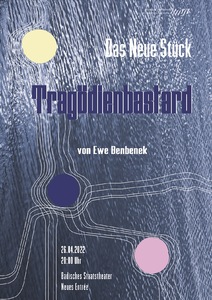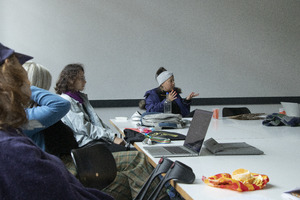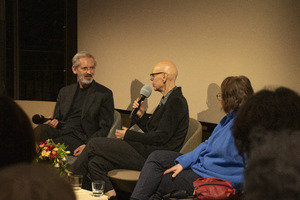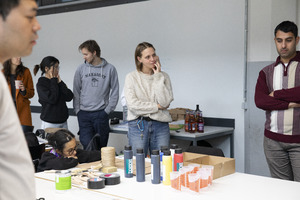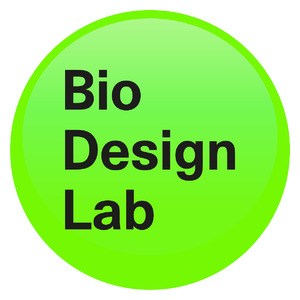Oh Tannenbaum!
Benachbarte Sets (53)Alle Zusammenhänge anzeigen
Diese Sets wurden den gleichen Sets hinzugefügt wie das ausgewählte Set.
53 Inhalte
- Seite 1 von 5
DNS #68
- Titel
- DNS #68
- Untertitel
- Tragödienbastard
- Autor/in
- Beschreibung (de)
- Es ist ein Akt der Emanzipation. Das mit dem Mühlheimer Dramatikerpreis gekrönte Stück erzählt in einem rhythmisch tobenden Redestrom davon, wie sich die Tochter polnischer Einwanderer und ihre „chosen sisters“ von der Last des Migrationsnarrativs befreien und zu dem werden, was sie eigentlich immer waren: Göttinnen.
Das Stück “Tragödienbastard” von Ewe Benbenek wurde im Wintersemester 2021/2022 im Rahmen des Seminars ‘Das neue Stück’ von Studierenden technisch und künstlerisch erarbeitet und in eine knapp zweistündige szenische Lesung umgesetzt. Das Projekt wurde von Constanze Fischbeck, Anna Haas und Eivind Haugland betreut sowie von Sandra Blatterer, welche in einem einwöchigen Lichtworkshop spannende Impulse zur Erarbeitung des Licht- und Bühnenkonzepts gab.
Im Anschluss an die szenische Lesung findet ein Nachgespräch mit der Autorin Ewe Benbenek und den Mitwirkenden statt.
- Es ist ein Akt der Emanzipation. Das mit dem Mühlheimer Dramatikerpreis gekrönte Stück erzählt in einem rhythmisch tobenden Redestrom davon, wie sich die Tochter polnischer Einwanderer und ihre „chosen sisters“ von der Last des Migrationsnarrativs befreien und zu dem werden, was sie eigentlich immer waren: Göttinnen.
- Beschreibung (en)
- It is an act of emancipation. The play, which was awarded the Mühlheim Dramatist Prize, tells the story of how the daughter of Polish immigrants and her "chosen sisters" free themselves from the burden of the migration narrative in a rhythmically raging stream of speech and become what they actually always were: Goddesses.
The play "Tragödienbastard" by Ewe Benbenek was technically and artistically developed by students in the winter semester 2021/2022 as part of the seminar 'Das neue Stück' and transformed into a staged reading lasting almost two hours. The project was supervised by Constanze Fischbeck, Anna Haas and Eivind Haugland as well as Sandra Blatterer, who gave exciting impulses for the development of the lighting and stage concept in a one-week lighting workshop.
The staged reading will be followed by a discussion with the author Ewe Benbenek and the participants.
- It is an act of emancipation. The play, which was awarded the Mühlheim Dramatist Prize, tells the story of how the daughter of Polish immigrants and her "chosen sisters" free themselves from the burden of the migration narrative in a rhythmically raging stream of speech and become what they actually always were: Goddesses.
- Typ des Projekts/Werks
- Schlagworte
- Datierung
- 26.04.2022
- Mitwirkende
- Sprache
- Dauer
- 2 Stunden
- Ort: Institution
- Ort
- neues Entrée
- Stadt
- Land
- Beteiligte Institution(en)
- Titel
- DNS #68
- Projektleiter/in
- Semester
- Studiengang
- Lehrveranstaltung
- Importiert am
- 20.12.2023
- Übergeordnete Sets
- 2
- Set enthält
- 0 9
Literatursalon HfG - ZKM
- Titel
- Literatursalon HfG - ZKM
- Titel (en)
- Literatursalon HfG - ZKM
- Autor/in
- Typ des Projekts/Werks
- Schlagworte
- Datierung
- 26.10.2023
- Ort: Institution
- Ort
- Media Lounge, R. 112
- Stadt
- Land
- Beteiligte Institution(en)
- Titel
- Literatursalon HfG - ZKM
- Importiert am
- 28.11.2023
- Übergeordnete Sets
- 1
- Set enthält
- 1 0
Vom Nutzen der Kunst
- Titel
- Vom Nutzen der Kunst
- Titel (en)
- On the benefits of art
- Autor/in
- Beschreibung (de)
- In der gemeinsamen Gesprächsreihe "Vom Nutzen der Kunst" von ZKM und HfG, laden wir internationale Gäste aus Philosophie, Literatur und Kunst zum offenen Austausch mit den Hochschulangehörigen, den Mitarbeitenden des ZKM und der Karlsruher Bevölkerung ein.
- Beschreibung (en)
- In the joint series of talks between ZKM and HfG, we invite international guests from the fields of philosophy, literature and art to an open exchange with members of the university, ZKM staff and the people of Karlsruhe.
- Typ des Projekts/Werks
- Schlagworte
- Datierung
- 16.11.2023
- Ort: Institution
- Ort
- Media Lounge
- Stadt
- Land
- Titel
- Vom Nutzen der Kunst
- Importiert am
- 28.11.2023
- Übergeordnete Sets
- 1
- Set enthält
- 2 0
PRESENT TENSE Working in Critical Times
- Titel
- PRESENT TENSE Working in Critical Times
- Titel (en)
- PRESENT TENSE Working in Critical Times
- Untertitel
- Symposium des Kunstbüros der Kunststiftung Baden-Württemberg
- Autor/in
- Beschreibung (de)
- „Present Tense” beschäftigt sich mit unserer unmittelbaren Gegenwart: Wir leben in einer komplexen, krisenhaften Zeit, in der die Überlagerung von Klima- und Energiekrise, Postpandemie, Prekarität und Konkurrenz, gesellschaftlicher Radikalisierung bis hin zu näher rückenden Kriegen bereits jetzt gravierende Auswirkungen auf unser Leben und Arbeiten hat. Die Anspannung steigt, wir stehen vor dringlichen gesamtgesellschaftlichen Aufgaben und bewegen uns zugleich in Richtung eines Zustands chronischer Erschöpfung. Das etablierte Kunstfeld und die künstlerische und kulturelle Produktion sind davon nicht ausgenommen. Mit Künstler:innen, Kurator:innen und anderen Expert:innen des kulturellen Feldes möchten wir den Blick auf die aktuelle künstlerische Produktion und Ausstellungspraxis richten und die Frage nach möglichen (Zukunfts-)perspektiven für das Kunstfeld diskutieren:
Welche gesellschaftliche Rolle können und müssen Kunst und ihre Produzent:innen in einer sich radikal verändernden Welt einnehmen? Wie können Kunst- und Kulturinstitutionen zu Orten aktiver gesellschaftlicher Transformation werden? Was bedeutet es, eine (ökologisch wie sozial) nachhaltige künstlerische und institutionelle Praxis in der digitalen Gegenwart zu entwickeln? Welche neuen Gemeinschaften brauchen wir, gerade im Hinblick auf die zunehmende gesellschaftliche Spaltung und Radikalisierung? Offensichtlich führt die krisenhafte Gegenwart u. a. dazu, dass sich Menschen nach autoritären Figuren und Programmen sehen – eine Aufgabe von Kunst und Kultur könnte es sein, andere, freiere Konzepte von Zukunft zu entwerfen.
Auch das Konzept der Fürsorge in der künstlerischen und kuratorischen Praxis wird Thema der Veranstaltung sein. Teil des Symposiums sind neben Vorträgen künstlerische Workshops, Interventionen und Performances, die wir als gleichwertige Formen der Wissensproduktion und -vermittlung begreifen.
Mit Beiträgen von Gin Bahc, Sascia Bailer, Constanze Fischbeck, Sina Hensel, Alistair Hudson, Anne Duk Hee Jordan, Valentina Karga, Matriarchale Volksküche, Jacob Ott und Dorothee Richter.
- „Present Tense” beschäftigt sich mit unserer unmittelbaren Gegenwart: Wir leben in einer komplexen, krisenhaften Zeit, in der die Überlagerung von Klima- und Energiekrise, Postpandemie, Prekarität und Konkurrenz, gesellschaftlicher Radikalisierung bis hin zu näher rückenden Kriegen bereits jetzt gravierende Auswirkungen auf unser Leben und Arbeiten hat. Die Anspannung steigt, wir stehen vor dringlichen gesamtgesellschaftlichen Aufgaben und bewegen uns zugleich in Richtung eines Zustands chronischer Erschöpfung. Das etablierte Kunstfeld und die künstlerische und kulturelle Produktion sind davon nicht ausgenommen. Mit Künstler:innen, Kurator:innen und anderen Expert:innen des kulturellen Feldes möchten wir den Blick auf die aktuelle künstlerische Produktion und Ausstellungspraxis richten und die Frage nach möglichen (Zukunfts-)perspektiven für das Kunstfeld diskutieren:
- Beschreibung (en)
- „Present Tense” concerns itself with our immediate present: We live in a complex, crisis-filled age in which the overlapping of climate and energy crisis, post-pandemic times, precarity, social radicalisation and even impending wars already govern our lives and work. Tension is rising, we are faced with imperative responsibilities for society as a whole and are, at the same time, moving towards a state of chronic exhaustion. There is no exception for the field of arts and artistic and cultural production.
Together with artists, curators and other experts from the cultural field, we would like to examine current artistic productions and exhibition practices and discuss possibilities for the (future) perspectives of the arts. Which roles within society can and must art and its producers embrace in a radically changing world? How can art and cultural institutions become venues of active social transformation? What does it mean to develop an (ecologically as well as socially) sustainable artistic and institutional practice in the digital present? The concept of care within artistic and curatorial practices will be a topic of the event as well.
What new relationships do we need, especially in view of intensifying social division and radicalisation? Obviously, the crisis-filled present among other things leads to people looking to authoritarian figures and programmes – one of the tasks for art and culture could be to design other, more independent and free concepts of the future.
In addition to lectures and panels, the symposium will include artistic workshops, interventions and performances, which are also forms of knowledge production and dissemination that we feel to be of equal importance.
With contributions from Gin Bahc, Sascia Bailer, Constanze Fischbeck, Sina Hensel, Alistair Hudson, Anne Duk Hee Jordan, Valentina Karga, Matriarchale Volksküche, Jacob Ott and Dorothee Richter
- „Present Tense” concerns itself with our immediate present: We live in a complex, crisis-filled age in which the overlapping of climate and energy crisis, post-pandemic times, precarity, social radicalisation and even impending wars already govern our lives and work. Tension is rising, we are faced with imperative responsibilities for society as a whole and are, at the same time, moving towards a state of chronic exhaustion. There is no exception for the field of arts and artistic and cultural production.
- Typ des Projekts/Werks
- Schlagworte
- Datierung
- 26.10.2023 - 28.10.2023
- Mitwirkende
- Sprache
- Ort: Institution
- Ort
- Lichthof, R.112
- Stadt
- Land
- Beteiligte Institution(en)
- Internetlinks
- Titel
- PRESENT TENSE Working in Critical Times
- Semester
- Importiert am
- 06.11.2023
- Übergeordnete Sets
- 1
- Set enthält
- 0 146
Bio Design Lab
- Titel
- Bio Design Lab
- Beschreibung (de)
- Das Bio Design Lab ist ein hybrider und evolutiver Ort, der sowohl im digitalen als auch im physischen Raum existiert. Konzipiert als wachsende Plattform, die die Fachbereiche der Staatlichen Hochschule für Gestaltung miteinander verbindet, wird das Labor als Raum für Präsentation, Bildung und Wissensvermittlung genutzt.
Das Bio Design Lab konzentriert sich auf die lokale Region, ihre Ressourcen und Möglichkeiten und zielt aktiv darauf ab, die Produktionsweisen in Karlsruhe und Süddeutschland umzugestalten und neu zu überdenken. Zur Interaktion mit diesen Themen und Materialien, sowohl im digitalen als auch im physischen Raum, lädt das Labor lokale ExpertInnen und BesucherInnen gleichermaßen ein an gemeinsamen Projekten zu arbeiten.
Spuren dieser Aktivitäten komplementieren ein ständig wachsenden Netzwerk.Das Wissen über diese Ressourcen wird durch die Erstellung eines Know-how-Glossars und einer Materialbibliothek destilliert, durch virtuelle und physische Workshops vermittelt, sowie durch die Präsentationen herausragender Projekte, die sich mit nachhaltigen Materialien befassen, kommuniziert.
Das Labor fungiert als Inkubator und Modell für Zusammenarbeit und Produktion, das im Einklang mit dem aktuellen Wandel der Staatlichen Hochschule für Gestaltung Karlsruhe steht.
- Das Bio Design Lab ist ein hybrider und evolutiver Ort, der sowohl im digitalen als auch im physischen Raum existiert. Konzipiert als wachsende Plattform, die die Fachbereiche der Staatlichen Hochschule für Gestaltung miteinander verbindet, wird das Labor als Raum für Präsentation, Bildung und Wissensvermittlung genutzt.
- Beschreibung (en)
- The Bio Design Lab is a hybrid and evolutive environment that exists in both the digital and physical space. Conceived as a platform for connection and collaboration with local partners and using local resources, the Lab hosts the presentation, education and transmission of knowledge. As students and experts are invited to work on bio-design related projects, visitors can explore and interact with the Lab’s production and lines of inquiry.
Projects within the Lab focus on the local region, its materials and possibilities, and actively aim to reshuffle and rethink modes of production in Karlsruhe and the south of Germany. Topics under exploration include Algae, Soil, Plants, Body, and Agriculture. To interact with these themes and related materials, both within the digital and physical space, the Lab invites local experts and visitors alike.
Within the Bio Design Lab, regional resources are collected by connecting with local partners; they are then distilled through the making of a know-how glossary and a material library, aiming to develop local materials. The knowledge around these resources is disseminated through virtual workshops and multimedia presentations of outstanding projects dealing with sustainable materials. Ultimately, traces of these activities will remain in a constantly growing network, both in the digital platform and in physical displays of existing and future objects.
The Lab works as an incubator and a model for collaboration and production that is in line with the current transformation of the Karlsruhe University of the Arts and Design Karlsruhe. It was first presented to the public in the context of Critical Zones, an exhibition at ZKM | Center for Art and Media.
- The Bio Design Lab is a hybrid and evolutive environment that exists in both the digital and physical space. Conceived as a platform for connection and collaboration with local partners and using local resources, the Lab hosts the presentation, education and transmission of knowledge. As students and experts are invited to work on bio-design related projects, visitors can explore and interact with the Lab’s production and lines of inquiry.
- Schlagworte
- Ort: Institution
- Ort
- Bio Design Lab
- Stadt
- Land
- Internetlinks
- Titel
- Bio Design Lab
- Projektleiter/in
- Importiert am
- 23.10.2023
- Übergeordnete Sets
- 1
- Set enthält
- 1 2
